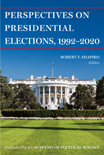
2021 · 355 Pages
ISBN13: 978-1-884853-16-6
Paperback: $27.50 (APS Members: $22.00)
Digital eBook: $14.50 (APS Members: $11.60)
Available Format: PDF
| Order: | Paperback eBook |
THE PURPOSE OF THIS BOOK, now in its fourth edition, is to provide in a single collection the articles of leading American scholars of presidential elections and presidential politics published in Political Science Quarterly, analyzing the major national elections from 1992 to 2020. The volume includes articles invited by the journal’s late, greatly admired Editor, Demetrios James (Jim) Caraley, to whom this volume is dedicated. . . .
The articles cumulatively chronicle the history of presidential elections in which there was a slow but major transformation of American politics, which has become stunning in its degree of ideological partisanship and its heightened level of emotions. This has involved a slow demographic and especially geographic internal realigning of the bases of the parties. There was not a wholesale partisan realignment involving a critical election that political scientists had been watching for. The basic and highly important nature of this development is apparent, drawing on important historical perspectives on elections and politics from political science. What was not apparent was that it would lead to the startling apex that it approached in the 2020 elections, culminating in the 6 January 2021 assault on the Capitol as Congress was about to certify the 2020 presidential electoral votes. Indeed, this was the culmination of what transpired during Donald Trump’s four years in office during which there were heated debates about facts, truth, and perceptions of reality, with the end result being a highly emotionally charged dispute over the counting of votes in key states—and how these states results should have been decided.
The critical development over the last decades ultimately leading to this dispute—and raising ongoing constitutional issues today about the right to vote—was the rising partisan conflict and polarization in politics that began to emerge in the 1970s and penetrated to the level of public opinion after the election of President Bill Clinton in 1992. This divisiveness has added a new and deeply troubling dimension to national and state elections in the United States: it has posed a threat and raised questions about the state of American democracy.
Perspectives on Presidential Elections, 1992–2020: Introduction
Robert Y. Shapiro
Ten Presidential Elections: Overview
Demetrios James Caraley
The 1992 Vote for President Clinton: Another Brittle Mandate?
Everett C. Ladd
1996 Vote: The “No Majority” Realignment Continues
Everett C. Ladd
The 2000 Presidential Election: Why the Democrats Lost
Gerald M. Pomper
The 2004 Presidential Election: The Emergence of a Permanent Majority?
Paul R. Abramson, John H. Aldrich, and David W. Rohde
The 2008 Presidential and Congressional Elections: Anti-Bush Referendum and Prospects for the Democratic Majority
Gary C. Jacobson
How the Economy and Partisanship Shaped the 2012 Presidential and Congressional Elections
Gary C. Jacobson
The Triumph of Polarized Partisanship in 2016: Donald Trump’s Improbable Victory
Gary C. Jacobson
Understanding White Polarization in the 2016 Vote for President: The Sobering Role of Racism and Sexism
Brian F. Schaffner, Matthew MacWilliams, and Tatishe Nteta
The Presidential and Congressional Elections of 2020: A National Referendum on the Trump Presidency
Gary C. Jacobson
The 2000 Election and Why Americans Need a Constitutional Right to Vote for Presidential Electors
Demetrios James Caraley
You will need a computer or device installed with either Adobe Reader or Adobe Digital Editions.
Adobe Reader is free and available for download at: http://get.adobe.com/reader. You will be able to view, print, and search our eBook PDF file. Use the bookmarks tab to navigate between chapters in the eBook.
Adobe Digital Editions is free and available for download at: http://www.adobe.com/products/digitaleditions. You will also be able to view, print, and search our eBook PDF file. Adobe Digital Editions has an added feature that allows you to add your own bookmarks.
No part of Academy of Political Science digital eBooks may be copied, downloaded, stored, further transmitted, transferred, distributed, altered, or otherwise used, in any form or by any means, except one stored electronic and one paper copy solely for the personal, noncommercial use of the purchaser. Contact the Academy for further permissions regarding the use of this work.
Join the Academy of Political Science and automatically receive Political Science Quarterly.
America at a Crossroads: The 2024 Presidential Election and Its Global Impact
April 24, 2024
8:30 a.m. – 12:00 p.m. ET
New York, NY
Virtual Issue
Introduction: Black Power and the Civil Rights Agendas of Charles V. Hamilton
Marylena Mantas and Robert Y. Shapiro
Publishing since 1886, PSQ is the most widely read and accessible scholarly journal with distinguished contributors such as: Lisa Anderson, Robert A. Dahl, Samuel P. Huntington, Robert Jervis, Joseph S. Nye, Jr., Theda Skocpol, Woodrow Wilson
view additional issuesArticles | Book reviews
The Academy of Political Science, promotes objective, scholarly analyses of political, social, and economic issues. Through its conferences and publications APS provides analysis and insight into both domestic and foreign policy issues.
With neither an ideological nor a partisan bias, PSQ looks at facts and analyzes data objectively to help readers understand what is really going on in national and world affairs.